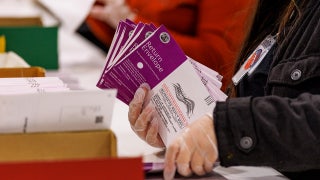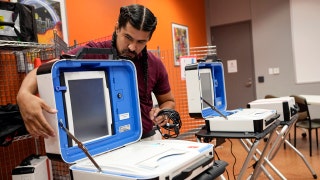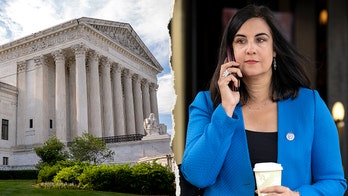Aides to Secretary of State John Kerry had billed the moment as a dramatic shift in U.S. policy, a major event that would in part define Kerry’s maiden overseas voyage as America’s top diplomat: his first face-to-face meeting, in Rome, with Sheikh Moaz al-Khatib, chairman of the Syrian Opposition Council.
A fiery former cleric at one of Syria’s premier mosques, Khatib is now the civilian head of the fractious band of rebels battling to overthrow dictatorial Syrian President Bashar al-Assad, in a two-year civil war that has claimed more than 70,000 lives and wreaked destruction in virtually all parts of the country.
Senior Obama administration officials argued that Kerry’s meeting with al-Khtaib, a slender, balding man with a smartly trimmed beard, would demonstrate a greater U.S. commitment to the rebel forces, who have made inroads on the capital, Damascus, in recent weeks.
At last, Kerry stood shoulder-to-shoulder with Khatib and Giuliano Terzi, Italy’s foreign minister, at Villa Madama, the ornate foreign ministry nestled in Rome’s scenic hillside gardens. There Kerry solemnly announced Washington’s pledge of $60 million in technical assistance to help the SOC establish itself as a political entity and begin delivering basic services – security, sanitation, education, criminal justice – in those areas of Syria newly liberated from Assad’s tyranny. As well, and for the first time, Kerry announced the U.S. would directly aid the fighting wing of the SOC, the Supreme Military Council, with meals and medical supplies.
As Kerry later told reporters, President Obama believed these actions, taken in concert with direct supplies of military hardware from European and Persian Gulf allies, would bolster the rebels and change Assad’s calculations on the ground: convince the dictator, in short, to step down and allow Syrians to chart a new, democratic future. “What we're doing today is part of a whole,” Kerry said. “And I am very confident that that whole is going to have the ability for President Assad to realize that he'd better start measuring more effectively what his future is, what his choices are, and what kinds of weapons he uses.”
The chief calculation of the Americans was that the SOC is the West’s best bet for a friendly post-Assad government, far preferable to al-Nusra, the Al Qaeda-linked battle unit that has most successfully carried the fight to Assad’s military. Equally concerning for Washington, which has blacklisted al-Nusra as a terrorist organization, is that the group has already begun delivering basic services to starving and beleaguered Syrian citizens, similar to the way Hamas and Hezbollah have done in other Mideast countries – and grown increasingly popular as a result.
But Khatib – who had threatened to boycott the Rome meeting in a sign of displeasure with the Obama administration’s support to date, and who was only enticed back to the table by a personal plea from Kerry, dialing from London – had other ideas about this trip-defining event.
He launched into a long and rambling diatribe that scarcely contained a “thank you” for the new pledges of American aid. Worse, Khatib gave little indication he shares the concerns of the White House and the State Department about the vital presence of al-Nusra in the rebel camp. “I am tired of [this],” Khatib said in Arabic, his voice at times bordering on shouting. “The mass media pay more attention to the length of the beard of a fighter than to the [government’s] massacres….No terrorists in the world have such a savage nature as that of the Syrian regime.”
Kerry stood there mute, helpless as the rebel leader continued shouting about the “mafia” that ruled Syria. All the secretary of state could do was stiffen his spine from time to time, as he slowly blinked and otherwise labored to contain his displeasure at a set of remarks that cannot have been even remotely like what he wanted to hear.
The episode offered Kerry, a former chairman of the Senate Foreign Relations Committee, an early reminder in his new post of the difficulties associated with dealing with one’s ostensible allies overseas. Indeed, he had just come from a grueling two-hour session in Berlin with Russian Foreign Minister Sergey Lavrov, a notoriously acerbic interlocutor who harangued Kerry with a long list of the Kremlin’s grievances before agreeing, unconvincingly, to work more collaboratively with Washington.
With the crucible of Rome behind him, Kerry was now at the mid-point of his debut on the world stage. Where he had spent his trek to four European capitals largely focused on the eternal headaches of the Mideast, now he was heading to the Mideast.
His next stop was Turkey, where Prime Minister Recep Erdogan, nearing the completion of his first decade in office, had created still more vexing problems for Kerry to contend with. Attending a U.N. conference in Vienna this week, Erdogan likened Zionism to fascism as “a crime against humanity.” Kerry aides said the secretary would convey “directly” to Erdogan the Obama administration’s displeasure when the two sit down in Ankara.
“We felt that statement was both offensive and wrong,” a senior Kerry aide told reporters in a background briefing aboard the blue and white aircraft, one of the Air Force One fleet of planes, ferrying the secretary and his entourage from Rome. “This was particularly offensive, frankly, to call Zionism a crime against humanity.”
Asked if the statement damages Washington’s ability to work with Turkey on the broad array of issues on which the two nations collaborate, which include aiding the Syrian rebels and trying to rein in Iran’s renegade nuclear program, the aide lamented: “It does have a corrosive effect.”
After Turkey, the fifth stop of Kerry’s nine-nation, eleven-day tour, he will head to what may be the most volatile country on his itinerary: Egypt. In Cairo, Kerry will meet with Egyptian President Mohamed Morsi, whose brief tenure has been marked by violent protests over his attempts to expand his presidential powers and judicial rulings that have inflamed roving gangs of thugs sometimes characterized as soccer fans.
For Kerry, whose foreign policy expertise in the Senate often required him to deal with intractable foreign leaders – such as Afghan President Hamid Karzai, and even Assad himself – this trip has exposed him anew to some of the world’s enduring problems and thorny personalities.
But although Kerry has dazzled some audiences with his gift for foreign languages – he has demonstrated fluency in at least three of them over the last week – his own inexperience as America’s top diplomat has occasionally showed.
During a town hall-style Q-and-A with German students at a hip Berlin coffee bar called Base Camp, a young woman wearing the traditional Muslim head cover asked Kerry about the state of religious tolerance in the United States. Kerry, pacing a small stage adorned with scoreboard-style signs that broadcast words like INNOVATE, at first defended America’s record on the subject. “As a country, as a society, we live and breathe the idea of religious freedom and religious tolerance,” he said.
But then – perhaps thinking of the members of the controversial Westboro Baptist Church, who protest at military funerals with placards denouncing homosexuality – Kerry tried to explain the concept that freedom of speech means countenancing precisely those forms of speech society deems most offensive. “In America,” he said to nervous laughter, “you have a right to be stupid if you want to be.”












































